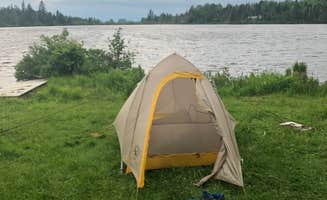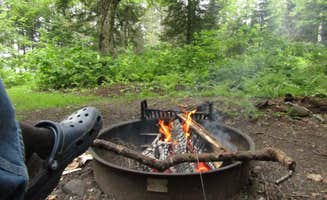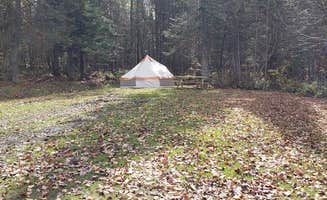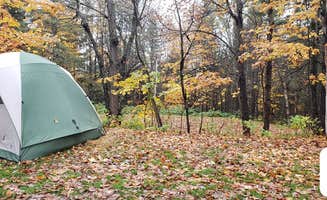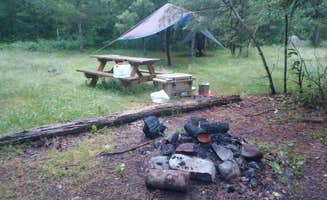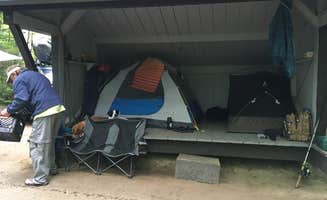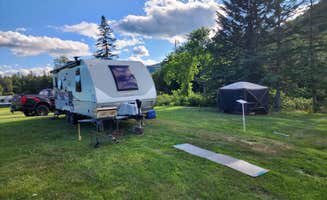Northern New Hampshire's camping options extend beyond the Connecticut River region with multiple sites accessible from West Stewartstown. The terrain rises from 1,050 feet elevation at West Stewartstown to over 3,300 feet in surrounding peaks. Many campgrounds close completely from November through April, with snow accumulation typically reaching 70-90 inches annually. Vault toilets replace flush facilities at more remote locations, and even summer nights can drop below 50°F.
What to do
Paddling opportunities: 30-minute drive from Pittsburg campsites allows access to remote waterways. "I highly recommend paddling at East Inlet (30min east of the campground)," notes a visitor to Lake Francis State Park Campground. The park rents kayaks and canoes seasonally with rates around $15-25 per hour.
Fishing access: Trout plentiful in both stocked and wild waters throughout the region. "Caught about a dozen small rainbows anchored at the head of the rapids," writes one camper at Mollidgewock State Park Campground. Lake Francis offers deeper water fishing with several boat launches available.
Hiking varied terrain: from short nature walks to challenging mountain ascents. "There are a few trails you can hike but the park is mostly centered on lake-based activities," explains one visitor about Lake Francis. The Cohos Trail passes through multiple campgrounds in the region, with sections ranging from easy to strenuous difficulty levels.
ATV trail access: Direct connections from several campgrounds to extensive trail networks. "If you're into ATV'ing, this is a great area for that as there is a large trail network and there is a large outfitter - Bear Rock Adventures- which rents ATVs less than 4 miles from the campground," mentions a Mollidgewock camper.
What campers like
Quiet atmosphere: Distance from cities creates notably peaceful camping experience. "It's a New Hampshire state campground so the prices are low and the place is very well-kept," notes a visitor to Lake Francis State Park Campground. Most campsites charge $25-35 per night for tent sites, with cabins ranging $50-125 depending on amenities.
Wildlife viewing: Dawn and dusk prime times for wildlife spotting, particularly along Route 16. "I got to experience my very first moose sighting! In fact, Rte 16, along where Mollidgewock is located, is one of the most prominent places for spotting moose in NH," reports one camper. Morning hours typically offer calmer waters for fishing.
Remote lakes: Limited development preserves natural shorelines at many campgrounds. "Listen to the Loons call as you hopefully see a Moose in what is known as Moose Alley," writes a camper at Deer Mountain Campground, where sites 28 and 26 require walking in but offer secluded water views.
Clean facilities: Well-maintained despite remoteness. "The bathroom was clean with large, private rooms providing shower/toilet/sink, a nice bonus during the pandemic," notes a visitor to Mountain View Cabins & Campground. Site maintenance varies by campground but state parks typically have daily cleaning schedules.
What you should know
Limited services: Few stores nearby. "Errol does not have much in the way of grocery stores and there are apparently two restaurants but we didn't check those out," mentions a Mollidgewock camper. Most campers bring all supplies as stores close early (typically 6-8pm) and have limited inventory.
Weather considerations: Rapid changes common even in summer months. "We weren't expecting a cold spell this late in May, but Mother Nature had her own plans!" explains one Deer Mountain camper. Night temperatures can drop below 50°F even in July and August.
Road conditions: Remote access routes may have seasonal damage. "Be careful when following certain gps/google directions…depending where you are coming from, you may end up on dirt roads/ATV trails (common in this region of NH) that could be hazardous in a passenger vehicle during poor conditions," cautions a visitor to Coleman State Park Campground.
Cell service gaps: Coverage limited throughout region. "This is a great place to go in the wilderness where it is quiet and no cell phone service at all for miles," notes a Lake Francis camper. Verizon typically has better coverage than other carriers, but reception remains spotty.
Tips for camping with families
Cabin alternatives: Multiple options for mixed camping styles. "The mix of site types is one of a kind for the area, Lodges, Cabins, Lean-to and tent sites," explains a Coleman State Park visitor. Lean-tos rent for approximately $40-60 per night and provide shelter during frequent rain showers.
Amenities for extended stays: Some campgrounds offer laundry facilities. "There is also a small laundry room with coin operated machines. Also on site is a soda vending machine and an AED," notes a Coleman State Park camper. Laundry typically costs $2-3 per load and requires quarters.
Water activities: Rentals available at several locations without need to transport equipment. "They rent kayaks/canoes on the property which was fun (saw a bald eagle)," shares a Mollidgewock visitor. Water temperatures remain cool even in summer, rarely exceeding 70°F.
Privacy considerations: Site selection matters. "Sites 15 and 16 are right along the water but don't have much privacy," advises a Deer Mountain camper. Campground maps often don't indicate actual spacing between sites or underbrush density for privacy.
Tips from RVers
Site accessibility: Many smaller RVs can access sites not marked for larger vehicles. "Note that many of the sites will fit much larger vehicles than what is stated on Reserve America, especially if you have a trailer and can unhook," explains a visitor to Ladd Pond Cabins And Campground. Most sites accommodate trailers under 25 feet more easily than larger units.
Hookup limitations: Partial services common at many campgrounds. "This is a family run campground located on a hillside between Lake Francis and First Connecticut Lake in Pittsburg, NH," notes a Mountain View Cabins visitor. Water pressure varies significantly between campgrounds, with 30-amp service more common than 50-amp.
Road considerations: Unpaved access to many sites requires careful navigation. "The road to my site was quite muddy, but the site itself was dry," mentions a Mountain View Cabins camper. Interior campground roads often have tight turns unsuitable for larger RVs over 30 feet.



